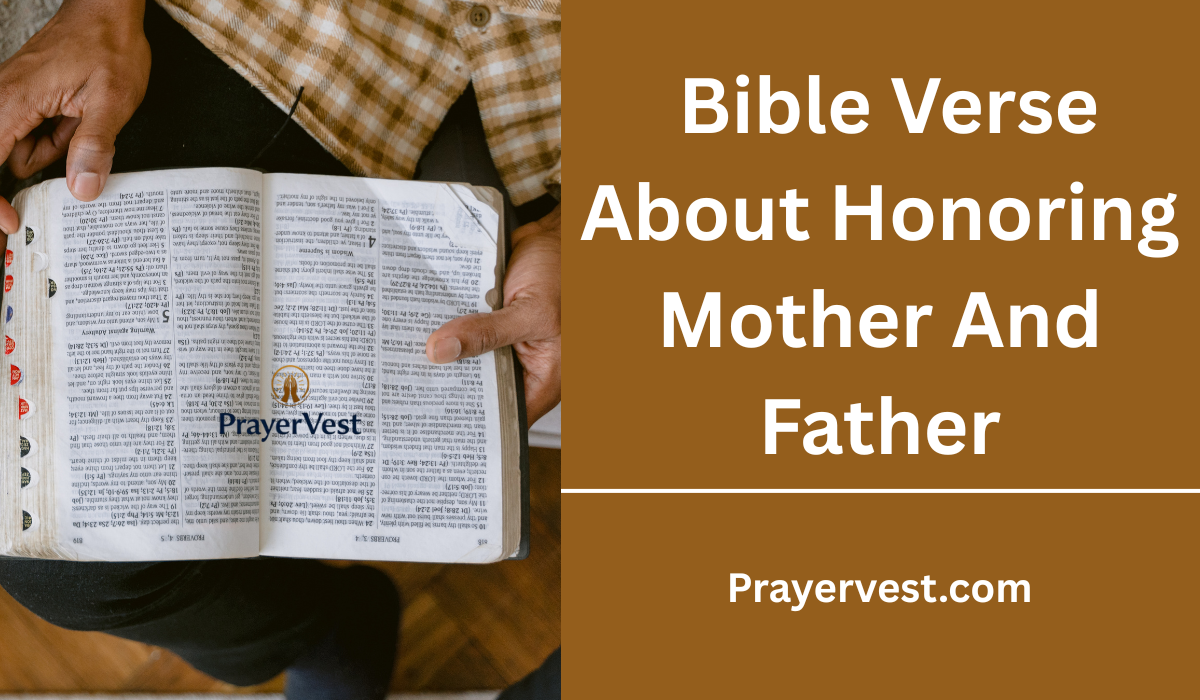Scripture has a demand that is both spiritually and practically significant: to honor one’s parents. The Bible continuously stresses obedience, love, and respect for parents, from the Ten Commandments in the Old Testament to the teachings of Jesus and the apostles in the New Testament.
This principle expresses an attitude of humility and thankfulness toward those God has put in charge of us, which goes beyond simple compliance on the outside. Because it instills obedience, respect, and selfless love, honoring parents is one of the fundamental ways we learn to honor God Himself.
This commandment is unique because it comes with a promise: “that it may go well with you and that you may live long in the land” (Ephesians 6:2-3). God attaches a blessing to the practice of honoring our parents, showing that it is not only a duty but also a pathway to divine favor.
While honoring our parents often begins in childhood through obedience, it continues into adulthood through care, support, and speaking well of them. Even when parents are imperfect, God calls us to treat them with dignity and respect, as a reflection of His character working within us.


Scriptures about respecting parents serve as a reminder that God has established and sanctified family ties. They lay a solid basis for society at large by encouraging us to exercise love, forgiveness, and patience in our own families. How we remember our parents’ memories and beliefs says a lot about our religion, regardless of whether they are here with us or have passed away. As we examine these verses, may we be motivated to fully obey this commandment—not just as a duty, but as a joyous act of devotion toward the God who created us.
40 Powerful Bible Verse About Honoring Mother And Father (2026)
1. Exodus 20:12
“Honor your father and your mother, so that you may live long in the land the LORD your God is giving you.”
This commandment, given directly by God on Mount Sinai, establishes the foundation for family relationships and social stability. It is the only commandment that comes with a promise—longevity and blessing in the land God provides. Honoring parents is not merely about obedience in childhood but involves a lifelong attitude of respect, care, and gratitude. This verse underscores that honoring one’s parents is directly connected to divine favor and the well-being of society as a whole.
2. Proverbs 1:8-9
“Listen, my son, to your father’s instruction and do not forsake your mother’s teaching. They are a garland to grace your head and a chain to adorn your neck.”
Here, Solomon paints a vivid image of parental guidance as an ornament of beauty and honor. The wisdom imparted by parents is likened to fine jewelry—something valuable, precious, and meant to be treasured. Listening to and applying the teachings of one’s father and mother not only leads to a life of integrity but also brings spiritual and moral adornment that others can see. This verse reveals that honoring parents includes valuing their counsel and allowing it to shape one’s character.
3. Ephesians 6:1-3
“Children, obey your parents in the Lord, for this is right. ‘Honor your father and mother’—which is the first commandment with a promise—‘so that it may go well with you and that you may enjoy long life on the earth.’”
Paul reiterates the Old Testament commandment, connecting it directly to Christian living. He makes it clear that honoring parents is not just a cultural value but a divine mandate. Obedience to the Lord reflects respect for God’s order and leads to blessings of peace, prosperity, and longevity. This verse reinforces that showing respect to parents is both a moral duty and a pathway to divine favor.
4. Leviticus 19:3
“Each of you must respect your mother and father, and you must observe my Sabbaths. I am the LORD your God.”
In this command, God places respect for parents alongside the observance of the Sabbath—both acts of obedience that honor Him. The pairing suggests that honoring one’s parents is not a lesser command but a central part of covenant faithfulness. Respect is expressed not only in words but also in attitudes and actions that uphold family harmony. This verse reminds us that showing reverence to our parents is a direct expression of our reverence for God.
5. Proverbs 23:22
“Listen to your father, who gave you life, and do not despise your mother when she is old.”
This verse calls for respect and care throughout a parent’s lifetime, especially in their later years. Honoring parents does not end when one reaches adulthood—it extends to valuing their wisdom, supporting them, and treating them with dignity as they age. God’s design for family relationships includes mutual care, and this verse beautifully upholds the responsibility of adult children toward their parents.
6. Colossians 3:20
“Children, obey your parents in everything, for this pleases the Lord.”
Paul gives a concise yet profound instruction: obedience to parents is an act of worship that delights God. This verse emphasizes that obedience is not merely about compliance but about seeking to please the Lord through family relationships. It also sets a foundation for discipline, mutual respect, and the passing down of godly values from one generation to the next.
7. Deuteronomy 5:16
“Honor your father and your mother, as the LORD your God has commanded you, so that you may live long and that it may go well with you in the land the LORD your God is giving you.”
This verse reinforces the enduring promise associated with honoring parents. God links respect for one’s father and mother directly to well-being and longevity, showing that family obedience is a cornerstone of societal and spiritual stability. It emphasizes that honoring parents is both a personal duty and a divine expectation with tangible blessings.
8. Proverbs 6:20-22
“My son, keep your father’s command and do not forsake your mother’s teaching. Bind them always on your heart; fasten them around your neck. When you walk, they will guide you; when you sleep, they will watch over you; when you awake, they will speak to you.”
Solomon portrays parental instruction as a protective guide throughout life. By treasuring their wisdom, children are given a moral compass that safeguards them in all situations. This verse demonstrates that honoring parents involves internalizing their guidance, allowing it to direct choices and actions in everyday life.
9. Psalm 128:3-4
“Your wife will be like a fruitful vine within your house; your children will be like olive shoots around your table. Yes, this will be the blessing for the man who fears the LORD.”
Though primarily about family blessings, this Psalm underscores the rewards of living in a God-fearing household, where respect and honor are given to parents and elders. The imagery of flourishing children reflects the spiritual and relational fruit that comes from honoring family relationships and following God’s ways.
10. Proverbs 19:26
“Whoever robs their father or mother and says, ‘It’s not wrong,’ is partner to one who destroys.”
This stern warning highlights the seriousness of dishonoring parents. Taking advantage of or neglecting one’s parents is equated with destructive behavior, showing that disrespect disrupts both family and moral order. The verse teaches that honoring parents is not optional but a critical aspect of living righteously before God.
11. 1 Timothy 5:4
“But if a widow has children or grandchildren, these should learn first of all to put their religion into practice by caring for their own family and making sure their parents are well provided for.”
Paul connects honoring parents with the practical care of their needs, especially in old age. Faith is demonstrated through action, not just words, and providing for parents reflects true devotion to God. This verse emphasizes that honoring parents includes responsibility, generosity, and ongoing commitment throughout life.
12. Proverbs 20:20
“If someone curses their father or mother, their lamp will be snuffed out in pitch darkness.”
This proverb vividly illustrates the spiritual consequences of disrespecting parents. God takes the honor of parents seriously, linking cursing or dishonoring them to loss and ruin. The verse serves as a strong reminder that family respect is foundational to spiritual and personal well-being.
13. Proverbs 23:24
“The father of a righteous child has great joy; a man who fathers a wise son rejoices in him.”
This verse highlights the mutual blessing of honoring and guiding parents. When children live righteously and value their parents’ instruction, it brings joy and satisfaction to the family. It illustrates that honoring parents creates a positive cycle of wisdom, respect, and blessing across generations.
14. Proverbs 30:17
“The eye that mocks a father, that scorns an aged mother, will be pecked out by the ravens of the valley, will be eaten by the vultures.”
This striking imagery emphasizes the severity of disrespecting parents. Mockery or scorn towards one’s father or mother is not trivial but carries serious spiritual consequences. The verse teaches that honoring parents is a moral imperative, warning against contempt and disregard.
15. Sirach 3:2-3
“For the LORD honors a father above the children, and he confirms a mother’s right over her children. Whoever honors their father atones for sins, and whoever glorifies their mother is like one who lays up treasure.”
Sirach links honoring parents directly to spiritual reward and divine approval. Respecting and valuing parents not only maintains family harmony but also has the power to cleanse and elevate one’s spiritual life. This verse underscores the eternal significance of honoring father and mother.
16. Proverbs 15:20
“A wise son brings joy to his father, but a foolish man despises his mother.”
This contrast shows the tangible impact of children’s behavior on their parents’ lives. Wisdom expressed through respect and obedience results in joy, while foolishness and disregard cause grief. Honoring parents is thus a reflection of personal wisdom and moral character.
17. Matthew 15:4
“For God said, ‘Honor your father and mother’ and ‘Anyone who curses their father or mother is to be put to death.’”
Jesus reaffirms the enduring authority of God’s commandment. This verse emphasizes the sacredness of family respect, showing that honoring parents is not merely cultural but divinely mandated. The seriousness of the instruction reflects God’s desire for relational integrity within families.
18. Proverbs 13:1
“A wise son heeds his father’s instruction, but a mocker does not respond to rebukes.”
Solomon contrasts the wise and foolish child, showing that listening to parents is a hallmark of wisdom. Honoring parents involves humility, receptiveness, and the willingness to learn, which shape character and prepare one for life’s challenges.
19. Luke 2:51
“Then he went down to Nazareth with them and was obedient to them. But his mother treasured all these things in her heart.”
Even Jesus demonstrated honor and obedience to His earthly parents. This verse shows that honoring parents is a lifelong practice, modeling respect, humility, and attentiveness. Mary’s reflection also highlights that honoring parents nurtures loving family bonds and spiritual insight.
20. Proverbs 10:1
“A wise son brings joy to his father, but a foolish son brings grief to his mother.”
Reiterating the theme of parental joy and sorrow, this verse emphasizes the emotional and relational impact of honoring—or dishonoring—parents. Respectful, wise behavior uplifts the family, whereas folly damages relationships and diminishes familial harmony.
21. Proverbs 17:6
“Children’s children are a crown to the aged, and parents are the pride of their children.”
This verse highlights the reciprocal blessing in honoring family. Grandchildren bring joy and honor to the elderly, while parents are a source of pride and identity for their children. Honoring parents contributes to the dignity, legacy, and continuity of family relationships across generations.
22. Proverbs 15:5
“A fool spurns a parent’s discipline, but whoever heeds correction shows prudence.”
Disregarding parental guidance is a mark of foolishness, whereas valuing correction demonstrates wisdom. Honoring parents includes accepting their guidance, learning from their experience, and applying their instruction to daily life for personal growth and moral development.
23. Ecclesiastes 3:1-2
“There is a time for everything, and a season for every activity under the heavens: a time to be born and a time to die, a time to plant and a time to uproot, a time to kill and a time to heal, a time to tear down and a time to build, a time to weep and a time to laugh, a time to mourn and a time to dance, a time to scatter stones and a time to gather them, a time to embrace and a time to refrain from embracing, a time to search and a time to give up, a time to keep and a time to throw away, a time to tear and a time to mend, a time to be silent and a time to speak, a time to love and a time to hate, a time for war and a time for peace.”
While this passage reflects the balance of life, it reminds us of the importance of timing in relationships, including honoring parents. There is a proper time for listening, caring, and supporting our parents—a practice that brings harmony and fulfills God’s design for family life.
24. Proverbs 4:1-2
“Listen, my sons, to a father’s instruction; pay attention and gain understanding. I give you sound learning, so do not forsake my teaching.”
Solomon’s exhortation emphasizes the value of parental instruction in shaping moral and spiritual wisdom. Honoring parents means valuing the lessons they impart, recognizing them as a source of guidance and understanding that equips children for life.
25. Proverbs 14:26
“Whoever fears the LORD has a secure fortress, and for their children it will be a refuge.”
Though focused on reverence for God, this verse connects the security of a family to the honoring of God’s principles, which include respect for parents. Families flourish when children honor their parents and uphold godly values, creating both spiritual and emotional refuge.
26. Proverbs 23:25
“May your father and mother rejoice; may she who gave you birth be joyful!”
This verse expresses the blessing that comes when children honor and bring joy to their parents. A child’s respect and gratitude are sources of happiness for the family, reflecting the fruit of godly upbringing and wise living.
27. Deuteronomy 27:16
“Cursed is anyone who dishonors their father or mother.” Then all the people shall say, ‘Amen!’”
This strong warning underscores the seriousness of honoring parents. Disrespect or dishonor carries not only social and relational consequences but also spiritual repercussions. God’s command is clear: honoring parents is sacred and non-negotiable.
28. Exodus 21:17
“Anyone who curses their father or mother is to be put to death.”
This verse reflects the gravity of parental disrespect in ancient Israelite law. It emphasizes that honoring parents is fundamental to maintaining moral and social order. Children are called to uphold respect, reverence, and obedience as an expression of faithfulness to God.
29. Proverbs 28:24
“Whoever robs their father or mother, and says, ‘It’s not wrong,’ is partner to one who destroys.”
Solomon warns against taking advantage of parents or denying responsibility. Dishonoring parents through theft or neglect disrupts family integrity and is equated with destruction. Honoring parents is therefore both a moral and spiritual imperative.
30. 1 Peter 3:7
“Husbands, in the same way be considerate as you live with your wives, and treat them with respect as the weaker partner and as heirs with you of the gracious gift of life, so that nothing will hinder your prayers.”
While this verse primarily addresses husbands, it models the principle of honor and respect in relationships, which includes familial respect. Treating parents and family members with consideration strengthens relationships and aligns with God’s desire for unity and reverence in households.
31. Proverbs 22:6
“Start children off on the way they should go, and even when they are old they will not turn from it.”
This verse emphasizes the lifelong impact of parental guidance and the responsibility of children to honor that instruction. Respecting and following parents’ teachings lays a foundation for moral integrity, wisdom, and spiritual growth that lasts throughout life.
32. Ecclesiastes 12:1-2
“Remember your Creator in the days of your youth, before the days of trouble come and the years approach when you will say, ‘I find no pleasure in them’—before the sun and the light and the moon and the stars grow dark, and the clouds return after the rain.”
Though primarily about remembering God, this passage reminds young people to honor the instruction of their parents while they are still able. Early obedience and respect cultivate a life of blessing and prepare children to carry Godly values into adulthood.
33. Proverbs 15:20
“A wise son brings joy to his father, but a foolish man despises his mother.”
This verse reinforces the emotional consequences of honoring or dishonoring parents. Wise behavior and respect result in familial joy, while folly and contempt cause grief. Honoring parents is a tangible way to express wisdom and love in everyday life.
34. Matthew 19:19
“Honor your father and mother, and love your neighbor as yourself.”
Jesus pairs honoring parents with loving others, showing that respect within the family is foundational to broader moral responsibility. Honoring parents is not an isolated command but part of God’s comprehensive plan for loving relationships and ethical living.
35. Leviticus 19:32
“Stand up in the presence of the aged, show respect for the elderly and revere your God. I am the LORD.”
While not limited to parents, this command reinforces the principle of respect for those who came before us. Honoring parents includes recognizing their wisdom, life experience, and dignity, reflecting reverence for God’s order in family and society.
36. Proverbs 3:1-2
“My son, do not forget my teaching, but keep my commands in your heart, for they will prolong your life many years and bring you peace and prosperity.”
Solomon emphasizes the blessing of remembering and following parental instruction. Honoring parents’ guidance brings not only relational harmony but also personal well-being, illustrating the interconnectedness of obedience, wisdom, and blessing.
37. Psalm 103:17-18
“But from everlasting to everlasting the LORD’s love is with those who fear him, and his righteousness with their children’s children—with those who keep his covenant and remember to obey his precepts.”
This passage underscores that honoring God’s commands, including honoring parents, creates generational blessings. Respect for parents and elders establishes a legacy of faith, righteousness, and divine favor across family lines.
38. Proverbs 14:26
“Whoever fears the LORD has a secure fortress, and for their children it will be a refuge.”
Reverence for God and honoring one’s parents work hand in hand to provide security and stability. Families thrive when children respect parental authority, creating a safe, nurturing environment for growth and spiritual maturity.
39. Ephesians 6:4
“Fathers, do not exasperate your children; instead, bring them up in the training and instruction of the Lord.”
This verse reminds parents that honoring God’s design includes both guidance and gentle instruction. By fostering respect and encouragement, parents model Godly leadership, which children are called to honor and follow throughout life.
40. Proverbs 31:28
“Her children arise and call her blessed; her husband also, and he praises her.”
The virtuous woman’s children honor her, showing that respect and admiration for parents is a mark of wisdom and gratitude. Honoring mother and father reflects a heart of love, recognition, and spiritual maturity that pleases God and strengthens family bonds.
Conclusion
In summary, respecting our parents is a heavenly mandate that influences our relationships, spirituality, and character. It goes beyond simple morality. The Bible makes it quite evident that treating our parents with love, respect, and care demonstrates our submission to God and our comprehension of His hierarchy of power. Whether through words of appreciation, acts of service, or consistent support, honoring parents builds stronger families and creates a legacy of love that can impact generations.
Ultimately, the call to honor father and mother extends beyond childhood into every stage of life. Even when relationships are strained or complicated, God’s Word challenges us to approach them with grace, humility, and forgiveness. By living out this principle, we not only obey a core commandment but also open ourselves to the blessings and peace that God promises to those who honor their parents. It is both a duty and a privilege that carries eternal significance.






